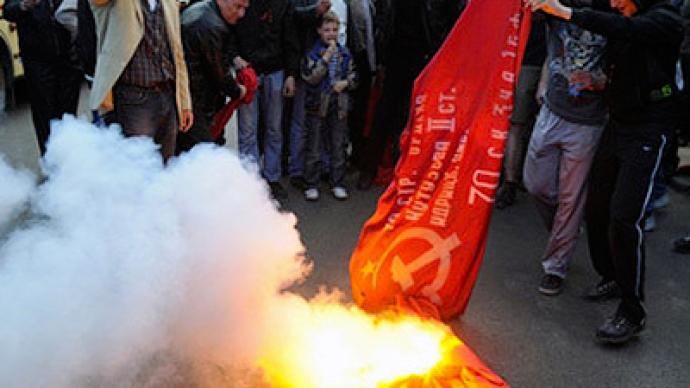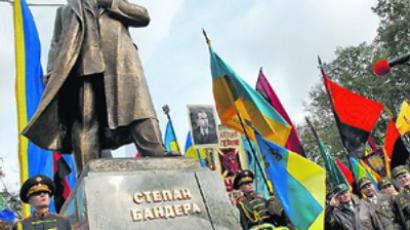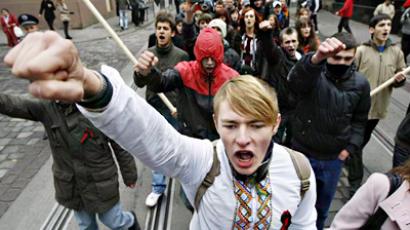Ukraine’s Constitutional Court bans use of red Victory banner

The red “Victory” banner is not among state symbols and should not be raised along with the national flag on Victory Day, the Constitutional Court of Ukraine ruled on Friday.
Ukraine will no longer use the banner that commeorates the victory in the Great Patriotic War, part of WWII, during official events. The court ruled that the banner does not belong to a list of national symbols, and its use is unconstitutional. The Constitutional Court had considered a petition of the parliament’s deputy, Yury Kostenko, who believes the use of the banner contradicts the country’s legislation on the recognition of victory in the war. He also believes some might use this banner to provoke separatist sentiments aimed at breaking up Ukraine. The legislation had earlier been adopted by the parliament, and President Viktor Yanukovich signed it on May 20. It envisions raising the red banner along with the national flag on flagstaffs on Victory Day, May 9. The Law on the Commemoration of Victory defines the red flag as “a symbol of victory of the Soviet people, army and navy over the Nazi Germany.” The Constitutional Court’s decision needs no discussions, said Anna German, head of the socio-political department of the Ukrainian president’s administration. The court’s ruling should be fulfilled, she said. But German asked at the same time if this decision may bring together people living in different parts of the country and “having different attitudes to the same events.” On May 9 this year, activists of radical nationalist parties in the Western city of Lvov (Ukrainian Lviv) disrupted a memorial service as veterans tried to pay tribute to the fallen in WWII. The nationalists ripped St. George’s ribbons, traditionally worn on Victory Day, from the chests of veterans. Members of the Liberty movement burnt red banners and also attacked Russian diplomats in Lvov who were preparing to lay a wreath at a military cemetery.In late May, Ukraine’s Communist Party announced plans to visit Lvov again together with Russian MPs on June 22 – the day Nazi Germany attacked the Soviet Union in 1941. The law on the red banner reflects the sentiments of society and conforms to historical truth, the Communists stressed.The Constitutional Court’s decision on the flag will seriously damage the authority of the state in the east of Ukraine, believes Russian State Duma Deputy Konstantin Zatulin. On the other hand, this move will encourage nationalists in the western parts of the country, he said. Zatulin described the court’s rule as a timeserving move showing “a two-faced approach” by the authorities. Taking into account the current political situation in Ukraine, it is difficult to believe that the current leadership “could not influence the court’s decision,” he told Interfax. The authorities earlier demonstrated respect for the feelings of those who live in southern and eastern parts of Ukraine, where Yanukovich’s electorate is predominantly concentrated. But after the presidential administration failed to take a position of principle on this issue, many questions will be raised, Zatulin said.Nationalists in the western parts, on the other hand, will take the ruling with enthusiasm, he believes. They might increase pressure on the state, trying to equate the status of former fighters of radical nationalist movements to that of WWII veterans. In any case, the court’s ruling will not calm down tensions over Ukraine’s past, the deputy said.














